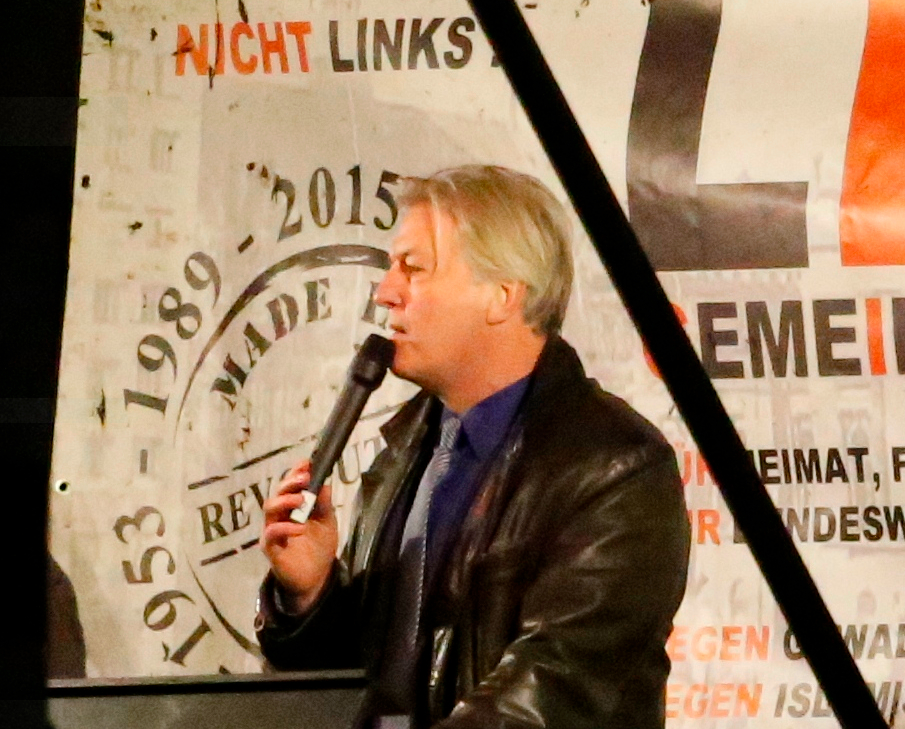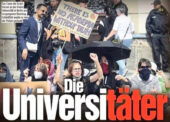“We simply want to overthrow the regime,” declared the founder of “Compact” last year. Nancy Faeser has therefore banned the publication under the law on associations. But there is also criticism.
On Saturday, an alliance of anti-fascist groups mobilised once again in Falkensee, near Berlin in the state of Brandenburg, to demonstrate against the magazine “Compact” with around 80 left-wingers under the slogan “Elsässer, shut up!”. Three days later, it is history: on Tuesday morning, the Federal Ministry of the Interior announced a ban on Jürgen Elsässer’s far-right hate magazine and ordered the police to carry out 14 searches in Brandenburg, Hesse, Saxony and Saxony-Anhalt. This affected the properties of “ten leading players”, it said in the afternoon. A total of 339 officers confiscated “magazines”, smartphones, cash, gold, data storage media, merchandising items, stage equipment, vehicles, company accounts and bank accounts, among other things.
The ban on the monthly magazine comes from the Minister of the Interior, Nancy Faeser (Social Democrats) personally and – although it is a company – is in accordance with the Law on Associations. Therefore, it does not require a court order. This also affects the company Conspect Film, which Elsässer used to broadcast content on YouTube. The account, marketed as a “TV channel”, has 345,000 subscribers. The videos posted there were still available on Tuesday, but the “Compact” website is offline.
“This magazine incites hatred against Jews, against people with a history of migration and against our parliamentary democracy in an unspeakable manner,” explained Faeser on Tuesday. The magazine pursues a “völkisch-nationalist social concept”, she continued. Population groups of Arab origin in particular are degraded as second-class citizens. “Compact” therefore also violates human dignity.
The justification for the ban also states that “Compact” is “aggressively militant”. It is therefore to be feared that “recipients of the media products” will be “incited and encouraged to act against the constitutional order”.
There is plenty of evidence for the Ministry of the Interior’s view on archive websites, where individual articles from the magazine and its special issues on certain topics can still be accessed. Elsässer presented “Compact” as a centre of resistance against a “dictatorship” in Berlin. His goal is to eliminate it: “We simply want to overthrow the regime,” he said last summer. At an event in Gera, Elsässer declared that he wanted to re-establish a “separate state called the GDR” in the East and that they had “a chancellor in the shape of Björn Höcke”.
Elsässer wanted to support the AfD before the state elections in Thuringia, Saxony and Brandenburg with a tour of events under the name “Blaue Welle” (Blue Wave) and advertise for donations – however, the party had this prohibited with a cease-and-desist declaration against “Compact” for fear of a party donation scandal.
Born in 1957 in Pforzheim, Baden, Jürgen Elsässer, who later became a teacher, was part of the left-wing spectrum until the noughties and wrote as an author, editor and co-editor of various media such as “Junge Welt”, “Jungle World”, “Konkret” and “Neues Deutschland”. Around 20 years ago, he moved into the far-right milieu. Elsässer recently expressed sympathy for the new Sahra Wagenknecht party.
The “Compact” magazine, founded by Elsässer in 2010, was run as a limited company and is said to have last appeared with a circulation of 40,000 copies. In February, the online campaign platform Campact launched a petition with the title “Stop ‘Compact’ – No right-wing agitation in railway station bookshops!”, which led to major railway station bookshops removing the magazine from their shelves.
However, the small “Compact” empire also included an online shop, which sells books, audio books, CDs and DVDs as well as merchandise such as clothing, posters, stickers, mugs and medals such as the “Höcke-Taler” and a “Donald Trump hero medal” in addition to its own print products. The companies’ annual turnover is estimated to be in the mid-single-digit millions.
Constitutional law experts criticise the ban. David Werdermann from the Gesellschaft für Freiheitsrechte (GFF), for example, said in response to an enquiry from “nd” that it was an abuse of the law on associations when it was actually about banning a newspaper. In addition, the proportionality is questionable. It would be a milder measure to take action against specific contributions if they contain illegal or criminal content. The “Compact” ban is therefore “probably unlawful”, he said. Together with the GFF, Werdermann submitted a statement in the proceedings to ban the left-wing internet platform “Indymedia Linksunten”, which was also banned under association law in 2017. The lawsuits and a constitutional complaint were dismissed on formal grounds.
The Committee for Fundamental Rights and Democracy from Cologne is similarly cautious, pointing out that the pro-Kurdish publishing house Mesopotamien Verlag and the music production and distribution company MIR Multimedia were also banned in 2019. “The Ministry of the Interior is thus undermining freedom of the press with the help of the law on associations,” says Laura Wisser from the committee’s executive board to “nd”. “Of course we consider a racist hate medium like ‘Compact’ to be dangerous. But we cannot ignore the constitutional and democratic dangers posed by such repressive measures.”
The Left Party group in the Bundestag, on the other hand, has given its explicit consent to the ban. “With its racism and anti-Semitism, the right-wing campaign magazine has long fuelled the mobilisation of Nazis and anti-Semitic conspiracy ideologies,” explained Martina Renner, spokesperson for domestic policy, on Tuesday.
The fact that the Brandenburg-based Compact magazine is a central player in the networking of the “New Right” is also pointed out by the state’s Office for the Protection of the Constitution in its reports. The organisation, which has been classified as “confirmed right-wing extremist” since 2021, has close links to the right-wing extremist “Identitarian Movement” and the right-wing extremist party spectrum, the latest report explains.
According to the Office for the Protection of the Constitution, “six official editors and a number of guest authors” regularly wrote for the print editions of the magazine in the 2023 reporting year. Other people were employed in the areas of events, dispatch and technology. Today’s ban classifies any continuation of the previous activities of “Compact” as a criminal offence.
However, the magazine can appeal against this before the Federal Administrative Court. A judgement by the court in Leipzig can ultimately be challenged before the Federal Constitutional Court in Karlsruhe.
In the magazine “Legal Tribune Online”, GFF lawyer Werdermann also refers to a judgement by the European Court of Human Rights from 2010. In this ruling, the judges considered the complete ban on several Turkish daily newspapers to be a disproportionate interference with Article 10 of the European Convention on Human Rights, which regulates freedom of expression and freedom of the press. Werdermann believes that these principles are also relevant in the present case.
Published in German in „nd“.
Image: Alexander Böhm, Jürgen Elsässer als Redner bei LEGIDA am 26. Oktober 2015, Ausschnitt, CC BY-SA 4.0





Leave a Reply